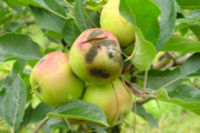
Venturia inaequalis genome project

Alpe scab disease (photo: B. Le Cam)
Apple scab disease caused by the ascomycete Venturia inaequalis is the most devastating disease in orchards in all worldwide areas where apples trees are cultivated (Gladieux et al. 2008). Its economic importance requires extremely high global annual fungicide input (10 to 30 sprays per year) with the corresponding environmental and health hazards and extra cost within emerging countries. Of peculiar concern is the spraying of fungicide inputs on fresh fruits for human consumption. Numerous reports of emergence of resistance to fungicides raise the problem of the scab control. In addition, although a lot of effort has been put in breeding for resistance, the fungus, as many other Dothideomycetes, has a very high potential to rapidly “breakdown” novel resistance sources and many research programs now specifically focus on durable management of resistance sources.
Numerous traits make V. inaequalis an original and relevant fungal model to address scientific issues related to pathogen evolution in relation with host breeding and host domestication (Gladieux et al., 2010 a), pathogenicity, host specificity and speciation process (Gladieux et al., 2010 b). At last the genome sequence of Malus x domestica should be soon released, making this host-pathogen interaction a very attractive model for evolutionary and functional genomic studies.
Objectives
- Genome sequencing by Genoscope (40 Mb is expected, 454 and SOLEXA technology)
- cDNA sequencing 25000 full length ESTs (Sanger technology)
- Structural annotation Gene prediction
- Transposable element annotation
- Functional annotation
- Manual curation
- Transcriptomics
- Comparative genomics
Results
- Genome assembly and ESTs sequencing have been released (restricted access).
- Genes and Transposable Elements have been annotated
- Data are available through restricted access
Creation date: 04 May 2010
 eZ Publish
eZ PublishPublication supervisor: A-F. Adam-Blondon
Read Credits & General Terms of Use
Read How to cite








